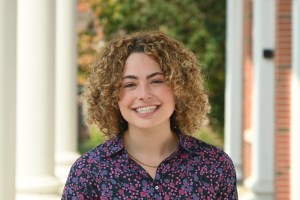Editor’s Note: The Community Covenant, which all Wheaton students and faculty sign, requires students to abstain from homosexual sexual behavior and dating, as well as persistent or exaggerated cross-dressing. The Covenant and accompanying Student Handbook emphasize that the college’s approach to gender minority students is to support eventual reconciliation with one’s biological sex assigned at birth. The students interviewed for this article did so under the condition of anonymity, and thus their names have been changed for their privacy.
Sarah, a freshman at Wheaton College, was used to their high school, where students would introduce themselves by sharing their name and pronouns.
“It wasn’t weird or different,” said Sarah, who identifies as non-binary and uses they/them pronouns. “People would be expected to be respectful, to not reject my experience.”
Upon arriving at Wheaton, Sarah was expecting things to be different. They were apprehensive about life at a traditional Christian college, wary of people who might not accept their gender identity
“I had this idea that most people wouldn’t like it if they found out I was non-binary and queer,” Sarah said.
Expectations about attending a Christian college were similar for Stacy, who identifies as queer and pansexual and uses she/her pronouns.
“When you’re walking into a Christian evangelical space, you can either only think about the ways you don’t fit in or you just start suppressing those parts of you,” she said.
Some students feel that the college forms much of its community based on the gender binary – male and female – and excludes students who identify differently. In many Christian spaces, faith, gender and sexuality have become contentious, with pronouns right at the center of these disagreements. Only a third of Americans (35%) say they would be comfortable with a friend using gender neutral pronouns—including 20% who would be very comfortable, according to data from the DC-based Public Religion Research Institute. Only 13% say they have a close relationship with who uses gender neutral pronouns.

Some students fear that the same is true at Wheaton, citing the exclusively “he/she” language in the Community Covenant and Student Handbook.
Some students who don’t use exclusively male or female pronouns are left wondering how they may be their most authentic selves in light of the language of the Community Covenant. For Oliver, who identifies as a transgender man, this means that they change their pronouns depending on how accepted, safe and comfortable they feel in a given situation. They referenced feeling gender dysphoria, which refers to a state of distress caused by a feeling that their gender identity does not align with their biological sex.
“When I’m around people who will respect pronouns, or where I feel like I’m not in danger, I would use he/they pronouns. Not because I’ve made a decision to transition, just because she/her pronouns give me a lot of dysphoria.”
For Oliver, the pronoun ‘they’ is merely another part of colloquial language.
“I feel like the usage of the singular ‘they’ doesn’t have to be political,” he said. “It makes it easier for me to be fully present in certain contexts. It kind of feels like Wheaton doesn’t believe that non-binary people exist.”
Gender-inclusive language is a small portion of every syllabus handed out at the beginning of each semester. While this section mandates that language include women, it is not clear about the implications for non-binary students.
“Terms such as ‘mankind,’ ‘man’ (when referring to both sexes), or ‘he’ as a generic third person singular, should be replaced with terms such as ‘humanity,’ ‘human’ or ‘person,’ and ‘he or she’,” says the Statement on Gender-Inclusive Language, which is included in every syllabus. But some students who are gender minorities at Wheaton feel that language surrounding the gender binary is often misunderstood in and out of the classroom.
“The assumption that I am a cisgender straight woman is sometimes taken as a given for the subject of conversation, and that feels awful. It is excluding me, even if unintentionally,” Sarah said.
They understand the gender inclusive portion of the syllabus to be inherently exclusive.
“The problem, in my mind, is that gender inclusive language is not applied more generally, by only using he or she, and requiring that there must be a gender element you are excluding people, ” they said. “Non-binary people are a tinier segment of the population, but we still exist.”
Mark Yarhouse, professor of psychology and director of the college’s Sexual and Gender Identity Institute, specializes in conflicts of religion and sexual and gender identity.
“There’s a lot of heterogeneity among sexual minorities on campus,” said Yarhouse. “Even the language ‘sexual minority,’ while it’s a very common language in psychology, is not common language in Christian settings.”
He is a part of a research project called the Sexual and Gender Identity Project, whose research has shown that being on a Christian campus is difficult for gender minority students. Students’ attitude around gender, he noted, can perpetuate these difficulties.
“A lot of times the campus climate is set by other students,” said Yarhouse. “A lot of those comments take place outside of earshot of faculty or staff.”
Cate, a queer student, said that students’ everyday jokes about being gay can add up. She also said her difficult experience as a Wheaton student is compounded by her cultural minority background.
“A lot of queer people are also people of color and that’s just a whole other added layer that isn’t always addressed,” she said. “It has been hard just existing in these spaces that are white, straight spaces where I feel like I don’t belong.”
Cate said she felt welcomed when she came out to her small group during urban Passage, Wheaton’s pre-orientation program in downtown Chicago.
“It was wonderful, like nothing had happened as opposed to it being this big moment,” she said. “That was exactly how I would have wanted it, because my sexual orientation isn’t the number one aspect of who I am. First and foremost, I’m a Christian.”

Sarah also noted that they know some students who are public about their gender identity. They are encouraged by other non-binary students’ openness and comfortability in their expression.
“I just heard the other day about a student that is openly non-binary, even with all of the professors,” said Sarah. “Even though I’m not quite there yet, it’s comforting to know that some students are doing that.”
Sarah said they chose to come to Wheaton to fully experience a Christian community and explore their own questions.
“I did think that being in a very Christian place, holding theological positions on queerness, that I would find unintuitive, would provide space that would allow me to wrestle with my questions,” they said.
There are campus groups who work to reach out to students who identify as gender minorities. The Refuge Discipleship Small Group, run by the chaplain’s office, aims to build community and share resources among these students. Eric Larson, ministry associate for discipleship in the chaplain’s office, meets with gender and sexual minority students.
“I think learning how to engage LGBTQ+ people with truth and with grace in the way that Jesus did is essential to our mission,” he said. “The reality is that many, probably most, Refuge students just have deep questions and they have challenging experiences that they need a place to work through in a safe community.”
Larson said the Christian evangelical tradition has historically not addressed issues related to matters of sexual and gender identity, excluding and hurting some within that community. He said he believes that the Bible calls members of the church to acknowledge these individuals’ pain.
“We see over and over that God’s love is patient – it’s faithful and endures,” he said. “For each of us, whatever our story is like, we each have examples of how God’s patience is shown to us. Yet, gender identity is one area where the church has not always demonstrated the patience that God has for people.”
Yarhouse recently wrote a book, “Talking to Kids about Gender Identity: A Roadmap for Christian Compassion, Civility, and Conviction,” where he gives guidance to Christians about how to talk about gender and gender identity from a Christian worldview. When he writes and speaks, he said, he tries to frame things in a way that is inclusive to anyone he may be addressing.
“A mistake churches have made is not realizing that sexual and gender minorities are already in their pews, already a part of the families that make up the fabric of the body of Christ,” he said.
Yarhouse said he believes that people in the church should seek to be representatives of Christ by leading with empathy.
“I think characteristics of ambassadorship would include convicted civility, seasoned with compassion,” he said. “When people know people who are navigating these spaces, it tends to help pull empathy and compassion forward.”
(Correction: A previous version of this story incorrectly did not identify Refuge as the Refuge Discipleship Small Group overseen by the chaplain’s office. The Record regrets the errors.)

